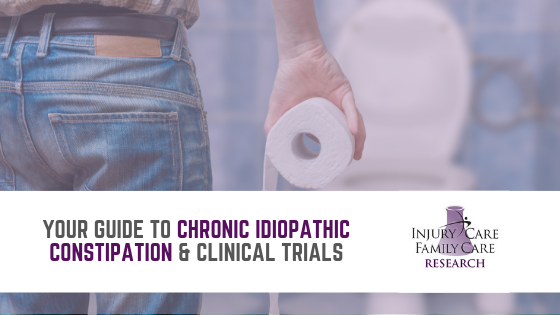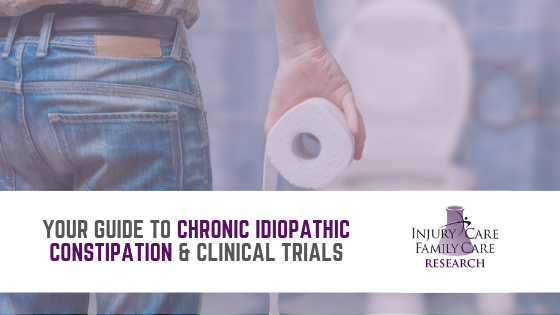Looking for a Chronic Idiopathic Constipation Clinical Trial in Boise, Idaho?

You’re in the right place.
Family Care Research is enrolling now for a Chronic Idiopathic Constipation (CIC) clinical trial. If you believe that you may be suffering from CIC, check out this comprehensive guide for some helpful insights on the condition.
Then, give us a call or apply online to see if you may qualify to participate in the study.
What Counts as “Constipated”?
Almost everyone experiences constipation occasionally in life. While there is no one “right” number of bowel movements to have per day/week… you can consider yourself constipated if you answer “Yes” to any of the following questions:
- Do you experience less than 3 bowel movements per week?
- Is it difficult or painful to pass stools?
- Are your stools lumpy or hard?
- Does your abdomen feel “blocked up” or do you feel as if you have not fully emptied your bowels after a trip to the bathroom?

What Causes Occasional Constipation?
Tons of things can trigger an episode of constipation including:
- Low fiber diets that are high in fat, sugar, or dairy
- Not drinking enough water
- Lack of exercise
- Overuse of laxatives and enemas
- Ignoring the urge to have a bowel movement
- Medical conditions (such as diabetes, hypothyroidism, Parkinson’s, or MS)
- Medications (such as pain medication, antidepressants, and even blood pressure pills)
Treating Non Chronic Constipation (Occasional Constipation) at Home
If your doctor has ruled out any underlying health conditions, you may consider treating your constipation at home with these simple measures:
- Fitting in more physical activity every day.
- Eating more fresh fruits and vegetables, whole-grain cereals and breads, and dried fruits (like prunes and figs).
- Adding a small amount of bran or fiber product, such as psyllium seed, to your meals.
- Drinking more water or juice.

If these tricks don’t relieve your symptoms, talk to your doctor to see whether laxatives or enemas may be beneficial to you.
In MOST cases, constipation can be cleared up with diet and lifestyle changes and doesn’t stick around for very long. With Chronic Idiopathic Constipation, though, that’s not the case.
How Is Occasional Constipation Different From Chronic Idiopathic Constipation?
Occasional constipation can be easily treated at home. It does not persist or keep coming back. Chronic constipation lingers for weeks or months and/or comes back again (and again) over time.
Chronic Idiopathic Constipation Prevalence: How Many People Have It?
Chronic Idiopathic Constipation prevalence is about 14% worldwide, making it one of the most common digestive disorders overall. However, it tends to be more common as people age, affecting up to one-third of people over the age of 60. (By comparison- almost everyone experiences occasional constipation at least once in their lifetime.)
What Chronic Idiopathic Constipation Symptoms Should You Watch For?
CIC symptoms cause:
- Hard, lumpy stools
- Bloating
- Infrequent bowel movements
- A lot of difficulty (straining) when moving your bowels
- The feeling that you just cannot empty your bowels completely, no matter how long you spend in the bathroom
THEY DON’T USUALLY CAUSE BELLY PAIN.
Frequent belly pain that goes away after a bowel movement, nausea, and loose stools between episodes of constipation are all associated with a different bowel condition called Irritable Bowel Syndrome with Constipation (IBS-C). Chronic Idiopathic Constipation and IBS-C can look very similar, but theses symptoms and certain tests can help your doctor determine which condition is affecting you.
What Causes Chronic Idiopathic Constipation?
While occasional constipation is almost always explained by medication usage, diet, or lifestyle, people with CIC may suffer with symptoms even without any of the above risk factors for constipation.
The symptoms of CIC can appear with no clear cause. In fact, the word “Idiopathic” means “spontaneous” or “without a known cause.”
In some cases, the muscle that surrounds the colon may be to blame.
Smooth muscle tissue (like that in your lungs or heart) surrounds your colon. When this muscle tissue contracts (squeezes), your body’s waste is pushed down toward the end of the digestive tract. The smooth muscle tissue surrounding a healthy colon contracts many, many times a day, even though you don’t usually feel it. For people with CIC, this muscle tissue may not be contracting often enough to move food through the bowel effectively. As a result, chronic constipation occurs.
Why Should You Join a Chronic Constipation Clinical Trial at Family Care Research in Boise ID?
We know that telling strangers all about your bowel habits isn’t your favorite thing to do. (Is it?) Even if you don’t find it embarrassing, bathroom habits can still be a sensitive subject.
So, wouldn’t signing up for a Chronic Idiopathic Constipation clinical trial in Boise, ID be a little… uncomfortable?
Chronic Idiopathic Constipation Clinical Trials You Can Be Comfortable With
Not to worry.
The Family Care Research staff is friendly, professional, and discreet. We promise to make you as comfortable as possible while we provide cutting-edge care for your Chronic Idiopathic Constipation. Family Care Research values your time, as well as your candidness as a clinical trial participant. The private health information that you share with us stays private.

Other benefits to volunteering to participate in medical research at Family Care Research include:
- careful evaluation of your personal health by a team headed by physicians renowned in the field of pain management, provided at no cost to you. No insurance is necessary;
- opportunities to receive new Chronic Idiopathic Constipation treatments before they are made available to the general public;
- the knowledge that you are making a personal contribution to the advancement of global health care through your participation, as well as Family Care Research’s partnership with Greater Gift.
Often, compensation is available to study volunteers for time and travel associated with participation.
Considering Joining a Chronic Idiopathic Constipation Clinical Trial in Boise, Idaho?
Start Here.
Know What You’re Getting Into
Are you hoping to find some relief with a Chronic Idiopathic Constipation clinical trial right here in Boise, Idaho?
It is important to us that you understand your rights as a clinical trial participant, as well as the basics of the clinical research process.
We’ve made it for you to get started with this easy quiz and accompanying article: Facts Vs. Myths in Clinical Research. Of course, our friendly recruitment specialists are also ready to answer your questions, as well.
Your Quick & Easy Evaluation

To participate in a Chronic Idiopathic Constipation clinical trial in our Boise, Idaho clinic, you’ll need to be evaluated by our team…
Chronic Idiopathic Constipation Diagnosis
A Chronic Idiopathic Constipation diagnosis may come from your primary care physician or gastroenterologist (GI doctor). You may also be officially evaluated and diagnosed by a Family Care Research physician during your clinical trial screening visit when the clinic is enrolling patients for Chronic Idiopathic
Constipation clinical trials in Boise ID.
Other Eligibility Criteria
No matter which clinic you visit, all clinical trial participants must have particular characteristics to join a study. In other words, not everyone who is constipated may be enrolled in a given trial. These qualifications, also known as eligibility criteria, are put in place by study sponsors for patient safety. They also help to make sure that the study’s results are well-defined and can be applied to future research. Finally, eligibility criteria help our recruitment specialists to identify which patients are most likely to experience potential benefits from the treatment each study investigates.
If you aren’t sure whether you should sign up for a study, our experienced recruitment specialists can help! They may ask you many questions to get a better picture of your health history:
- What kinds of constipation treatments have you tried before?
- Your age, race, and gender (Some studies are designed to examine how a new treatment works in a very specific population.)
- How much do your symptoms interfere with daily life? Which symptoms do you struggle with the most?
- Do you have other health conditions besides Chronic Idiopathic Constipation that may influence the results of the study?
- Are you able to attend regular follow up visits at our clinic in Boise, Idaho?

Our recruitment specialists do more than ask questions; they answer them, too.
Whether you apply by phone, by email, or over the phone –our staff is ready to answer your questions and explain your risks, potential benefits, and rights as a participant in a Chronic Idiopathic Constipation clinical trial at our clinic in Boise, Idaho.
How to Apply To Try A New Chronic Idiopathic Constipation Treatment
Before actually applying, take a moment to look over the Study Participants page on the Family Care Research Family Care Research website.
This page serves as a “short & sweet” guide to questions that other patient participants ask us frequently.
After you’ve submitted your online application to participate in a Chronic Idiopathic Constipation clinical trial at Family Care Research’s Boise, ID location, it will be received by one of our recruitment specialists for review. We will reach out to you as soon as possible to answer your questions and guide you through the rest of the enrollment process.
If you prefer, you may also call us directly at 208-621-2503 to learn more about the Chronic Idiopathic Constipation clinical trial.
We appreciate you interest in our clinical trials, and we’re eagerly awaiting your application. Let’s work together to drive the development of modern treatment solutions that will benefit Chronic Idiopathic Constipation patients worldwide.

